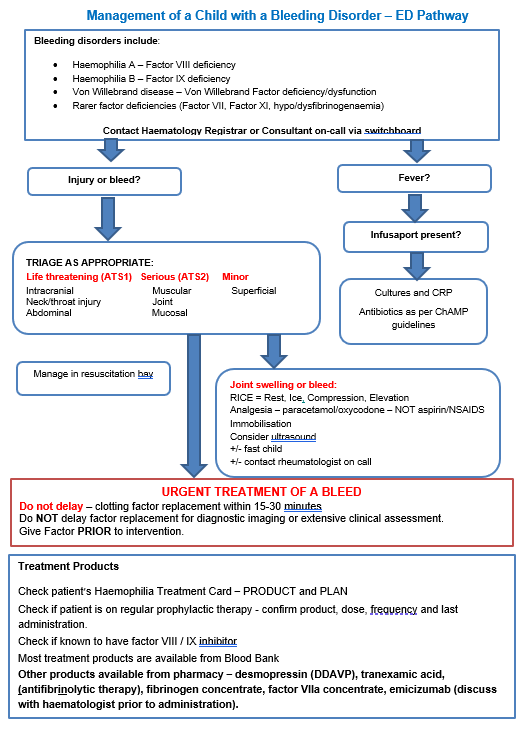Bleeding disorders - management
Disclaimer
These guidelines have been produced to guide clinical decision making for the medical, nursing and allied health staff of Perth Children’s Hospital. They are not strict protocols, and they do not replace the judgement of a senior clinician. Clinical common-sense should be applied at all times. These clinical guidelines should never be relied on as a substitute for proper assessment with respect to the particular circumstances of each case and the needs of each patient. Clinicians should also consider the local skill level available and their local area policies before following any guideline.
Read the full PCH Emergency Department disclaimer.
|
Aim
To guide Emergency Department (ED) staff with the management of a child with a known bleeding disorder.
Background
- Haemophilia A – Factor VIII deficiency
- Haemophilia B – Factor IX deficiency
- von Willebrand disease – von Willebrannd Factor (VWF) deficiency / dysfunction
- disorders (FVII deficiency, FXI deficiency, hypo/dysfibrinogenaemia)
Presentation
- Injury or bleeding
- Fever – be wary of central line infections in haemophilia patients with a Central Venous Access Device.

LEGEND: ATS = Australian Triage Scale; CRP = C Reactive Protein; NSAIDS – Non-steroidal Anti-inflammatory Drug; ChAMP = Children’s Antimicrobial Management Program
Management of bleeds
Intracranial bleed
|
Muscular bleeds |
Superficial bruises |
Neck/throat injury
|
Joint bleeds |
|
| Abdominal bleed |
Mucosal |
|
Life threatening and serious bleeds should be ATS category 1 or 2
Life threatening
- Manage in resuscitation room
- Call haematology fellow / consultant immediately
- Give factor without delay
Serious
- Give Factor without delay
- RICE = Rest, Ice, Compression, Elevation and Immobilisation
- Analgesia – paracetamol / oxycodone – NOT Aspirin / NSAIDs
- Ultrasound / X-rays as clinically appropriate
- +/- fast child and contact rheumatologist on call if joint bleed.
Minor
- Assess and treat as clinically indicated
Treatment
DO NOT DELAY ADMINISTRATION OF FACTOR
DO NOT ACCESS INFUSAPORT IF INSERTED WITHIN LAST 5 DAYS (unless under instruction of Haematologist).
- Clotting factor replacement should be administered within 15 – 30 minutes
- Do NOT delay factor replacement for diagnostic imaging or extensive clinical assessment
- Give factor PRIOR to intervention
- Every child known to PCH will have a treatment card which details:
- Type of bleeding disorder
- Treatment product (including brand name) and if on regular replacement
- Presence of factor VIII/IX inhibitor.
- If the patient does not present with the treatment card, the parents or patient should know these details.
Factors
Available from Blood Bank.
Haemophilia A:
- Recombinant factor VIII: Short Half Life: Xyntha®, Advate®
- Extended Half Life: Eloctate®, Adynovate®
- Plasma-derived Factor VIII and von Willebrand factor (VWF): Biostate®
Haemophilia B:
- Recombinant Factor IX: BeneFIX® (SHL)
- Extended Half Life: Alprolix® (EHL)
von Willebrand Disease treatment (if non-responsive to desmopressin):
- Plasma-derived factor VIII and VWF Biostate®
Patients with Inhibitors:
- Recombinant factor VIIa: NovoSeven®RT
Other products available from Pharmacy:
- Desmopressin (DDAVP)
- Tranexamic Acid, (antifibrinolytic therapy)
- Emicizumab – discuss with Haematologist prior to administration.
Management of Fever
Bibliography
- Textbook of Paediatric Emergency Medicine 3rd Edition Browne 2018 Elsevier
- Nelson Textbook of Pediatrics: 20th Edition Robert M. Kliegman, Bonita M.D. Stanton, Joseph St. Geme, Nina F Schor Publisher: 2016, Elsevier.
| Endorsed by: |
Co-Director, Surgical Services |
Date: |
Ma7 2025 |
This document can be made available in alternative formats on request for a person with a disability.